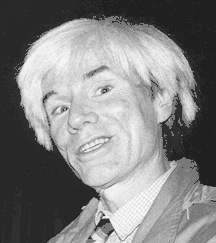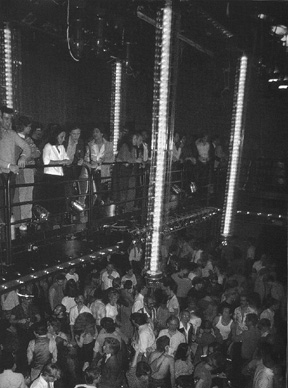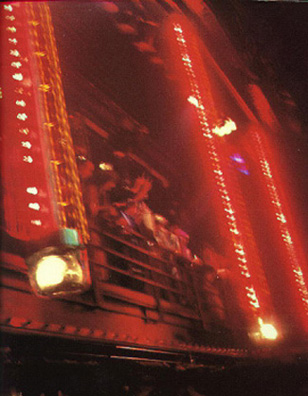
![]()
This is an interview done by Bob Colacello talking to Steve, one of the owners of Studio 54. Other people included in this interview is Andy Warhol, and Bianca Jagger, Truman Capeto.
BOB: I'm always amazed when that silver man in the moon drops from the sky, and then the coke spoon goes up his nose . . .
STEVE: Next, we're doing a popper with a cerebrum, a cerebellum, and all the parts of the brain. And the popper is going to shoot up the nose, which will light up the brain, and then the whole thing is going to explode. Every night it's going to explode - fight on the dance floor.
BOB: Did you ever dream you'd meet all these people who come to your discos?
STEVE: No, and I love it.
BOB: Bianca, Mick, Baryshnikov, Rod Stewart . . .
STEVE: And we get along; I like them. I always got my enjoyment out of people, not out of things. If I didn't make one red cent, I would do Studio 54.
BOB: When are memberships starting?
STEVE: We're giving out the cards, but it's all done by sight. That's why I stay by the door. People say, "Why do you subject yourself to staying by the door?" But if I leave the door alone, the crowd doesn't end up the way I want it. There's a certain type of person we don't pass. People come to me and say, "I'm a millionaire from Tucson, Arizona," but I don't care what they are if they're not fun, if they're going to be bumps on a log and sit around.
BOB: Girls tell me you won't let single girls in.
STEVE: Well, we don't want it to be a pickup place. If we become an East Side singles place then it stops being fun because everybody concentrates on picking people up instead of having fun.
BOB: Is it a gay bar, basically?
STEVE: It's bisexual. Very bisexual. Very, very, very bisexual. And that's how we choose the crowd, too. In other words, we want everybody to be fun and good-looking.
BOB: How do you choose the waiters?
STEVE: They're as important as the lights, the sound, and everything else. It's a total environment place and they have to be fun and they dance around. I encourage them to be friendly and have a good time and just be very, very, very loose. The waiters, bartenders, everybody. People go there to have a good time, it's their evening out, they don't go there to have any problems. Once they get through the door they can do anything they want. Some people say it's hard to get through the door but that's very important, to keep the place that way. You know the other night Rod [Stewart] was really worried about how people would react to him and he just loosened right up. He was dancing, running around the dance floor. I don't know if you saw him Wednesday night with Elton [John]?
STEVE: Oh, they're wonderful. Some people knock them, but they're wonderful people. People knock Sinatra. He filmed there last week. He couldn't have been nicer.
BOB: People always knock celebrities.
STEVE: I don't know why. Like Bianca, she's a sweet heart, you know. She never asks for anything. She just always wants to come in and have fun and not be bothered by photographers and the press. She's warm. After her birthday party we went back to her house and she and Halston made breakfast. It was one of the most fabulous moments of my life.
By the time the following interview was published, in June 1978, Studio had become as important a New York destination as the Empire State Building, and Rubell and his partner, Ian Schrager, were experiencing more and more of the problems associated with success. Colacello, Rubell, and Andy Warhol lunched at the Upper East Side restaurant Quo Vadis.
BOB: Could we have you photographed on Monday? The photo studio is downtown near us.
STEVE: That's no problem. I bought a limousine. It's the best. I hated buying it. I probably haven't spent a nickel from the Studio. I still live off my restaurants.
[KIRK DOUGLAS stops by.]
BOB: Mr. Douglas, this is Steve Rubell, the owner of Studio 54.
STEVE: I heard you were there last night.
KIRK: I love your place.
STEVE: We had a party earlier and I went home to sleep for two hours. I heard you were there and I hurried to get there but you'd left. I got there at one o'clock.
KIRK: I enjoyed it very much. We'll be back there again.
STEVE: How long are you in New York?
KIRK: I have to go to a Friars function for Walter Cronkite, David Brinkley, and Howard K. Smith. I leave this weekend.
STEVE: If you can, try to make it in. I'd love to have you.
KIRK: I'll come and see you again. Take care of yourself.
[KIRK leaves.]
BOB: How do you decide who gets in? Remember, Andy, you once told me Steve has his rules.
ANDY: Yes. But he always changes them.
BOB: You don't let people in who wear their collars outside their jacket.
STEVE: Right. I hate that. And I hate those plaid polyester shirts or those double-knit suits. It looks like Saturday Night Fever. We don't want that look.
[BIANCA JAGGER arrives.]
BIANCA: How are you, children?
BOB: Hollywood left.
BIANCA: I'm so glad. No competition. I finally got my eight hours.
STEVE: I'm going to sleep this afternoon. I've got to do it.
ANDY: Steve, maybe you could name every person that's ever come into the club - or everyone that went to Bianca's party.
BIANCA: I can tell you: Misha, Liza, David Frost, Paul Simon, Carol Lynley, Candice Bergen, Art Garfunkel, Cardin, Ryan O'Neal . . .
STEVE: Then you can go on to different contingents.
BIANCA: . . . Halston, Truman Capote, Nan Kempner, Jerry Zipkin, Mica and Ahmet Ertegun, Prince and Princess Rupert Lowenstein.
 ANDY: I kept missing you last night, Bianca.
ANDY: I kept missing you last night, Bianca.
BIANCA: I know. I kept calling you everywhere. You told me you were going to Elaine's, so I went to Elaine's.
ANDY: I went to Trader Vic's for a drink. Then I went to the Studio. Your message on the phone was, "Let's go to Studio 54 at eleven-thirty."
BIANCA: The perfect hour is between eleven-thirty and two. I think two is the limit and one should go to bed.
[BIANCA leaves.]
STEVE: Now we're starting on [our patty for] Valentine's Day. It's like doing a production. We're probably doing a St. Valentine's Day Massacre.
TRUMAN: You know that thing in the back where those people get up and dance? We could all line up and have somebody bring a machine gun and mow us down.
ANDY: A real machine gun?
STEVE: The other day, when I got that pie in the face, I went into shock for a second.
BOB: You're not somebody until that guy has thrown a pie in your face.
STEVE: It was a real cheap pie.
ANDY: The one he threw at me was cherry. With fake whipped cream.
TRUMAN: What did you expect, Les Delices Cote Basque?
BOB: Steve, where did you go to high school?
STEVE: Wingate. That's in Brooklyn. I was playing a lot of tennis at the time. My father always said the biggest problem I had on the tennis courts was that I'd never concentrate on the ball. I was always looking around to see what was going on around me.
TRUMAN: You still do that.
STEVE: Oh, yeah.
TRUMAN: I notice it quite often at the Studio. When you're talking to somebody you're already talking to somebody else. Of course, that's natural by the very nature of the role and the job you have to do there. It's so difficult to live right in the moment, isn't it?
STEVE: It's very difficult, but I like it. I have to know what's going on everywhere in the room - at least for two-thirds of the night. I'm always watching the door. It's got to be like people coming into your living room. If you're inviting ten people into your living room, there are certain people you wouldn't want to have because they all wouldn't mix. I think the best thing to do is keep it so that one group doesn't override the whole place.
TRUMAN: Balancing the canvas.
STEVE: Or making a salad. It's the same thing. It's like casting a play. If it gets too straight then there's not enough energy in the room. If it gets too gay then there's no glamour. It's no fun. There are no pretty girls.
ANDY: Nobody ever bothers you [at Studio].
STEVE: There are certain celebrities who are very open
to people. There are others that just walk by and aren't. If you have a
Dolly Parton, she opens herself up to everybody. It's almost dangerous.
Diana Ross is very open to the people. She likes to dance. She also likes
to sit down and be alone. I think Lillian Carter was the funniest [recent
visitor]. She said, "Why are all these boys dancing together? There
are all these pretty girls around."

Sometimes, when I'm sitting up in that booth at 54, I think about all the dead people who would have loved 54. It's a shame they're not around - people like Ronald Firbank or Toulouse-Lautrec or Baudelaire or Oscar Wilde or Carl Van Vechten. Cole Porter would have loved it.
ANDY: Senator McCarthy.
TRUMAN: He would have loved it.
ANDY: Dorothy Kilgallen.
TRUMAN: She would have loved it.
BOB: Hedda Hopper.
TRUMAN: No, she was a bore.
STEVE: I didn't think Bob Hope would like it, but he did. He was dancing.
ANDY: He's probably a lot of fun.
TRUMAN: I knew Bob Hope when I had a house in Palm Springs. I knew his wife. She's quite nice.
STEVE: Johnny Carson took his shirt off. He's a good sport. The most difficult people are probably the rock people.
TRUMAN: They don't like disco.
STEVE: They're all doing it. Mick Jagger has a disco song - "Miss You."
TRUMAN: That's rather good.
BOB: Who thought of the name Studio 54?
STEVE: That was the name of the theater. It was called Studio 52. It made no sense to be called Studio 52 when it was on 54th Street. That meant everybody would go to 52nd Street. Although people don't even think like that from out of town. They never know where it is. They don't know that 54 means 54th Street. I was coming here in a taxi. The driver said, "I tell people not to go there because I know they're not going to get in. I know which ones will get in." This is a cabdriver. He knows which ones won't get in. He said, "You won't get in and I know who gets in." He said, "I try to tell them they just aren't dressed right." He was dead serious. He was like a real truck-driver cabdriver. He said, "I always tell them they won't get in. I just wait and I pick them right back up in the car."
ANDY: Do you have a hard time getting in, Truman?
TRUMAN: Occasionally, they can't see me. I'm too short.
BOB: Was John Kennedy, Jr., there on New Year's Eve?
ANDY: No. They were away.
STEVE: I hate missing it when something goes on in the place.
BOB: The most exciting person I ever met there was a deaf-mute hillbilly at the Dolly Parton party.
STEVE: People come there in wheelchairs. There was a guy there Tuesday night in a wheelchair. I said, "Why are you here?" He said, "Why shouldn't I be here?"
TRUMAN: That's a good answer.
BOB: I've never seen you dance at 54, Steve.
STEVE: I do - late. You see the pictures. There are all these places where I've found out people have been hiding and things have been going on that I'm trying to end. I don't want to lose control.
ANDY: That one room up near the stairway. People disappear in there.
STEVE: Do you know how Dolly Parton left the Studio the night of the raid? She said, "Oh, I don't want to leave with the regulars." On top of the balcony there's a staircase. It's like a ladder thing. She went down five stories. That's how she left. She said, "I came in an exciting way. I want to leave in an exciting way."
STEVE: I got a call from a bartender and he's in Paris. He met somebody New Year's Eve and they left the next day for Paris. He won't be back for two weeks.
TRUMAN: "Come to work at Studio 54 and spend all your weekends in Paris, Rome, Venice . . ."
STEVE: Aside from summer, Thanksgiving and Christmas week are the best times to come. People are always looking for someone to go away with. Those are key times if you want to travel. In the summer, if you're there during the week, you can always be somewhere for the weekend.
When Bob Colacello spoke with Steve Rubell for the March 1980 issue of Interview, Rubell and Schrager were on the way to jail, having been convicted of tax evasion.
BOB: Steve, what are you going to do the night before you go [to jail]?
STEVE: The night before I go I'm going to go to the Studio. I'm looking forward to hearing a lot, so you'd better give me a lot of good information. I've never not grown from a period in my life, no matter how bad it seemed when it was beginning. I think I've been sort of on a whirlwind and I think it might be good to stop now even though it's forced and I wish it wasn't forced. I'm going away with a very good sense. At the [going-away] party the other night, the people were so nice. Who was there? It was De Niro, Pacino, Diana Ross, Lauren Hutton, Richard Gere, Barry Diller, Debbie Harry. They've been so supportive. I'm sure there are people who are happy and are saying we deserve what we got. [But most] people have been so fiercely loyal. Some of the media like to say that these people desert people, but they don't. I'm not looking forward to going away, but I do know that we have the best people in the city who on their own could do anything. The day after the sentence everyone who works there came around and they all looked so bad. I was so busy trying to console them that I'd forgotten that I'd just been sentenced.
After two changes of ownership, Studio 54 closed for good in March 1986.
|
|
